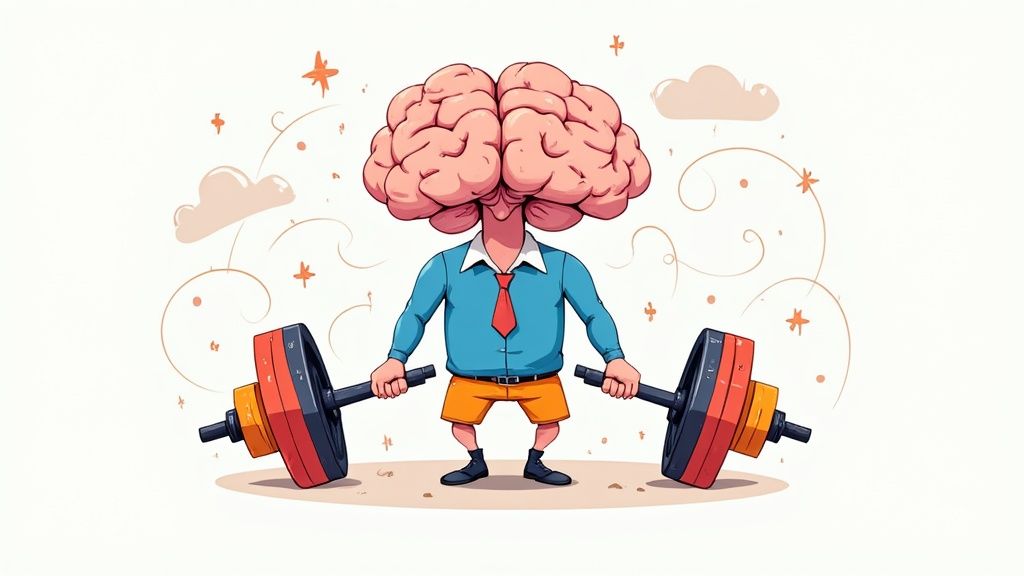How to Improve Focus: A Science-Based Guide to Mastering Concentration


Understanding Modern Focus Challenges
Staying focued in our hyper-conected world has become increassingly dificult. This isn't just about willpowr - our atention pattrns have fundamentaly changed due to constant digital distracions. Simply telling yoursef to concetrate harder often fails when faced with endless notifcations and easy entertanment optons. To improve focuss efectively, we need to undrstand how atention works in our modern enviroment.
The Shrinking Attention Span
Research shows our ability to concentrate is declining significantly. Studies indicate that the average attention span dropped from 12 seconds in 2000 to just 8 seconds in 2020, largely due to increased technology use and persistent multitasking habits. This makes developing strong focus skills more important than ever for success in work and life. Learn more about attention span research at Attain Behavioral Health.
The Multitasking Myth
Despite popular belief, multitasking actually damages our ability to focus. Research shows that people who frequently multitask have more trouble concentrating and maintaining attention compared to those who focus on one task at a time. This happens because our brains aren't built for juggling multiple complex activities - instead, we rapidly switch between tasks, which drains mental energy. The key to better focus is embracing single-task work sessions rather than trying to do everything at once.
Identifying Your Focus Destroyers
While technology presents challenges, improving focus requires understanding your personal distractions. These focus destroyers vary for each person. For some, constant email checking disrupts workflow, while others struggle with social media notifications or news site browsing. Even background music with lyrics can break concentration for certain people. The first step to managing distractions is recognizing which specific factors interrupt your focus most often.
Turning Distractions Into Advantages
Instead of viewing technology only as an obstacle, we can use it strategically to enhance focus. Many apps can block distracting websites or structure work periods. Quality headphones can create an environment suited for deep work. Success requires actively shaping our relationship with technology rather than letting it control us. By understanding how attention works and using tools mindfully, we can develop sustainable practices that support concentrated effort and help us achieve our goals.
Mastering the Art of Structured Work Intervals
Getting your best work done requires more than just eliminating distractions - it's about working in harmony with your brain's natural attention cycles. Rather than pushing through long stretches without breaks, strategic work intervals can help you stay focused and energized.
The Power of Focused Intervals
Your concentration works much like a muscle that needs both exercise and rest to perform well. When you alternate between periods of focused work and brief recovery breaks, you can maintain better mental clarity throughout the day. The Pomodoro Technique offers a simple but effective approach: work intensely for 25 minutes, then take a 5-minute break. Research shows this method can boost productivity by 25% compared to working straight through. For example, when software development teams adopted timed work intervals, they reported feeling more focused and accomplished while experiencing less mental drain. Learn more about concentration techniques at Spencer Institute.
Customizing Your Work Intervals
While the Pomodoro method works well for many people, the ideal work period length varies by individual and task. Some people hit their stride with 45-minute focused sessions, while others do better with 15-minute sprints. Take time to test different interval lengths and see what helps you maintain deep focus without burning out. Complex tasks often benefit from shorter work periods with more frequent breaks.
Optimizing Your Break Time
Making the most of your breaks is crucial for maintaining productivity. The key is finding activities that help your mind reset without completely losing momentum.
Movement: Simple activities like stretching, walking, or breathing exercises can refresh your focus
Hydration: Keep water nearby and use breaks to rehydrate, since even mild dehydration can fog up your thinking
Mindful Disengagement: Choose break activities that let your mind wander gently - like looking out a window or listening to calm music
By creating a consistent rhythm of focused work and mindful breaks, you can maintain better concentration while avoiding mental fatigue. This balanced approach helps you accomplish more while feeling more in control of your workday.
Strategic Breaks: The Hidden Key to Peak Performance
Working hours on end might feel productive on the surface, but it often leads to poorer focus and mental drain. Understanding how to take strategic breaks can dramatically improve both your focus and overall output.
The Science of Taking Breaks
Many assume powering through tasks without stopping is most efficient, but research suggests otherwise. Even brief diversions can significantly boost concentration and prevent what scientists call vigilance decrement - the natural decline in performance that happens when focusing on one thing too long. A key 2011 study in Cognition showed that participants who took short breaks during a 50-minute task kept performing well, while those who worked straight through saw their performance drop notably. Learn more about this research here.
Timing Your Breaks for Maximum Impact
When you take breaks matters as much as taking them at all. While everyone's rhythm differs, one proven approach is the 52/17 rule: focus intensely for 52 minutes, then rest for 17 minutes. This pattern allows for both deep work and proper recovery. Try different intervals to find what works best for your tasks and energy levels.
Designing Your Ideal Break Activities
The way you spend your breaks shapes how effective they are. Good break activities help you mentally disconnect while keeping your mind engaged in a different way:
Physical Movement: A quick walk, some basic stretches, or light exercise gets your blood flowing and sharpens your focus
Mindful Activities: Simple meditation, deep breathing exercises, or listening to calming music can help reset your mental state
Creative Expression: Activities like sketching or doodling have been shown to improve memory and concentration
Breaks in the Workplace
More companies now recognize that regular breaks boost productivity and creativity while preventing burnout. By making breaks a normal part of the workday, organizations are seeing measurable improvements in employee output and satisfaction. The key is viewing breaks not as lost time, but as essential recharge periods that enable sustained high performance throughout the day.
Designing Your Ultimate Focus Environment

Your ability to focus deeply depends heavily on your environment. By thoughtfully designing both your physical and digital workspaces, you can create conditions that naturally support sustained concentration. Small changes to your surroundings can make a big difference in your productivity and mental clarity.
Optimizing Your Physical Workspace
The space where you work shapes your ability to concentrate in profound ways. Here are key elements to consider:
Lighting: Natural sunlight works best for most people. If that's not available, choose soft, warm artificial lighting to reduce eye strain and help you stay alert.
Sound: While quiet generally supports focus, some people work better with background sounds like white noise. Test different sound environments and consider noise-canceling headphones if needed.
Temperature: Keep your workspace slightly cool - around 68-72°F (20-22°C). A room that's too warm can make you drowsy and unfocused.
Organization: Clear visual clutter from your desk and keep only essential items within reach. A tidy space helps maintain a clear mind.
Dedicated Area: Set up a specific spot just for focused work. This creates a mental boundary between work and relaxation, helping your brain shift into concentration mode.
Mastering Your Digital Environment
Your digital workspace needs just as much attention as your physical one. Here's how to reduce online distractions:
Notifications: Switch off alerts that aren't crucial for your current task. This includes email, social media, and news notifications that can break your focus.
Desktop Organization: Sort your digital files and clean up your computer desktop regularly. A cluttered screen can be as distracting as a messy desk.
Focus Tools: Use apps that block distracting websites during work sessions. These create clear boundaries that help you stay on task.
Email Habits: Check email at set times rather than constantly monitoring your inbox. This puts you in control of your workflow.
Creating Personalized Focus Triggers
Small rituals can signal your brain that it's time to concentrate. These personal focus triggers might include:
Lighting a specific candle at your desk
Playing a particular playlist
Using a special mug for your work sessions
Drawing or doodling during meetings
Research shows that light creative activities like doodling can actually improve focus - one study found that people who doodled during a recorded message remembered 29% more information than those who just listened. These seemingly simple actions can become powerful tools for shifting your mind into a focused state. By actively shaping both your physical and digital environments, you create a space that naturally supports deep work and concentration.
Optimizing Your Body and Mind for Laser Focus

Good focus relies on both your mental and physical wellbeing. When you take care of your body through proper nutrition, regular exercise, and quality sleep, you directly improve your ability to concentrate and maintain attention. Let's explore the key physical factors that help build exceptional focus.
Fueling Your Focus: Nutrition for Cognitive Performance
Your brain needs specific nutrients to function at its best, just like a car needs the right fuel to run smoothly. Foods rich in omega-3 fatty acids - found in salmon, walnuts, and flax seeds - help boost brain function and mental clarity. Adding antioxidant-rich foods like blueberries, leafy greens, and dark chocolate protects your brain cells and supports sustained focus. When you eat a balanced diet throughout the day, you give your brain steady energy to maintain concentration.
Exercise: Movement for Mental Clarity
Physical activity does more than just keep your body fit - it's essential for sharp mental focus. When you exercise, blood flow to your brain increases, delivering vital oxygen and nutrients. Research shows that even a 20-minute walk can improve your attention span and ability to concentrate. Adding movement to your daily routine, whether it's a morning workout or an afternoon walk, helps clear mental fog and enhance focus naturally.
Sleep: The Foundation of Focus
Quality sleep is critical for maintaining focus - it's when your brain processes information and clears out waste that can cloud thinking. Most adults need 7-9 hours of sleep each night for optimal brain function. Create good sleep habits by sticking to a regular bedtime and making your bedroom cool, dark, and quiet. When you consistently get enough restorative sleep, you'll notice improved concentration and mental stamina during the day.
Supplements and Timing Strategies: Enhancing Cognitive Function
Certain supplements may help boost your focus when used properly. B vitamins and magnesium support overall brain health and energy levels, though you should always check with your doctor before starting any supplement. Timing your meals strategically also matters - eating smaller portions more frequently helps maintain stable blood sugar and sustained energy. When you combine good nutrition, regular exercise, quality sleep, and targeted supplements, you create ideal conditions for maintaining sharp focus throughout your day.
Building Unshakeable Focus Habits
Like strengthening physical muscles, developing mental focus takes daily practice and dedication. By establishing the right habits and systems, you can transform scattered attention into laser-sharp concentration. Let's explore proven techniques to make focus a natural part of your daily routine.
The Power of Habit Formation for Focus
Your ability to focus improves with consistent exercise, just like building physical strength. The key is incorporating focus-enhancing activities into your regular schedule - whether that's setting aside specific work blocks, taking strategic breaks, or practicing brief meditation sessions. As these behaviors become automatic through repetition, maintaining focus gets progressively easier.
Tracking Progress and Celebrating Milestones
Keeping tabs on your focus journey provides valuable insights and motivation. Use a simple journal or app to log your focused work periods and note what helps or hinders your concentration. For example, if you notice your focus consistently dips after lunch, you might try a quick walk or 5-minute meditation to reset. Remember to celebrate small wins - acknowledging progress, even minor improvements, helps cement positive habits.
Overcoming Obstacles and Maintaining Motivation
Expect some bumps along the road as you build new habits. Common challenges like distractions can be managed by optimizing your workspace and using website blockers during focused periods. When motivation wanes, remind yourself why improved focus matters - picture getting more done with less stress and frustration. This mental rehearsal strengthens your commitment to the process.
Creating Accountability and Automating Focus
Team up with an accountability partner who shares your focus goals. Regular check-ins create positive peer pressure and mutual support. Make focus habits easier by automating what you can - set calendar reminders for focused work sessions, use apps that automatically block distracting sites, and build routines that trigger concentration naturally. The more you can put on autopilot, the less willpower you'll need to stay focused.
Want to delve deeper into coaching techniques and personal development strategies? Visit Coaching Hub for valuable resources and expert insights to empower your coaching practice and personal growth journey.